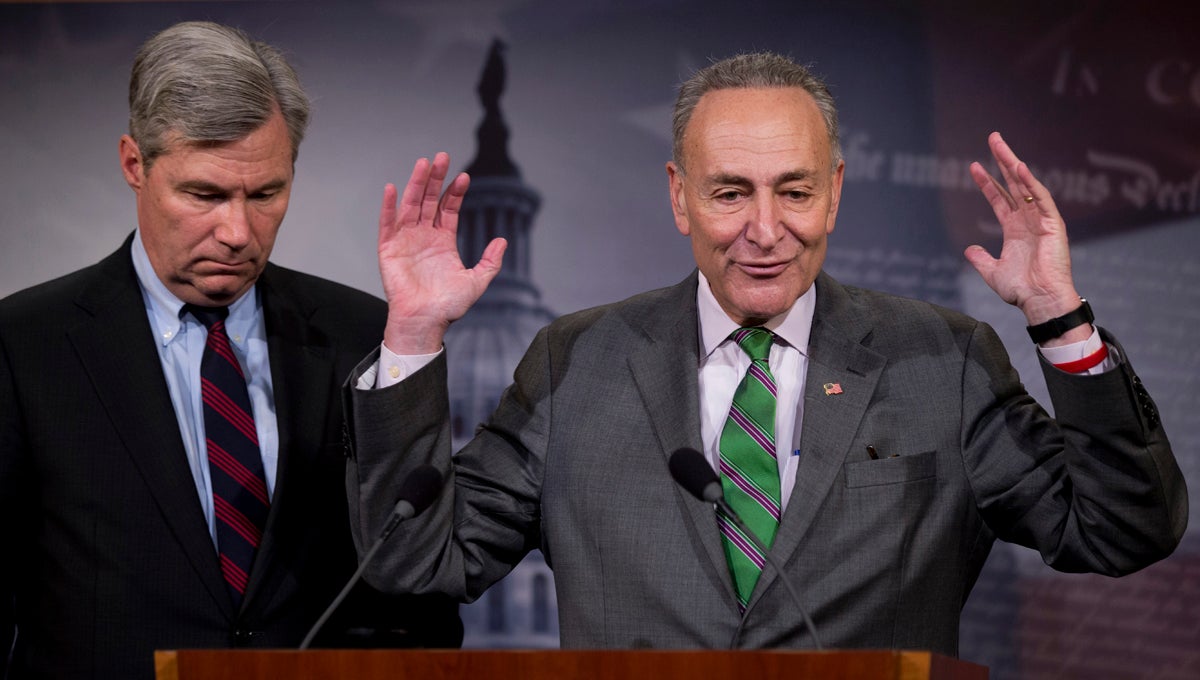The fat cat court, and why voting is important

Sen. Charles Schumer, D-N.Y., right, accompanied by Sen. Sheldon Whitehouse, D-R.I., speak to reporters on Capitol Hill in Washington, Wednesday, April 2, 2014, about the Supreme Court¹s decision in the McCutcheon vs. FEC case, in which the Court struck down limits in federal law on the aggregate campaign contributions individual donors may make to candidates, political parties, and political action committees. (AP Photo/Manuel Balce Ceneta)
I have a burning question for all those Americans who think that voting doesn’t make a difference.
Now that the high court’s five Republican appointees have struck yet another blow for electoral plutocracy – making it even easier for the fat cats to dominate our campaigns – I have a burning question for all those Americans who think that voting doesn’t make a difference. I’ll ask it nicely.
What frickin planet do you people live on?
And the rest of this post is an open letter to the non-voters:
Yo. Slackers. If you really think the two parties are the same and that elections don’t have consequences, I suggest you bone up on how the high court’s Republican quintet – hired by Ronald Reagan and the Bushes – has been systematically assaulting citizen-based democracy. In a string of decisions since 2007, the berobed GOPers have gutted the post-Watergate anti-corruption reforms that barred fat cats from drowning out the average Joe. They gutted anew yesterday, essentially declaring in McCutcheon v. FEC that plutocratic empowerment is what freedom is all about.
You’re wondering, “What’s that got to do with me not voting?” Bear with me.
Until yesterday, the law said that a person could directly donate a maximum of $123,200 to all federal candidates and political party committees during a two-year election cycle. But John Roberts and his allies decided that this requirement unfairly constrained the freedom of rich folk who wanted to donate much more than that six-figure pittance. As Roberts wrote yesterday, “There is no right in our democracy more basic than the right to participate in electing our political leaders.”
So the Republican appointees removed the fat cat shackles and decreed that, henceforth during a two-year election cycle, each deep-pocketed person can directly donate as much as $3.6 million to all federal candidates and party committees. The more money a person has, the greater his “right to participate.”
Whatever happened to the idea of leveling the playing field? Roberts says nah. In his words, “It is not an acceptable governmental objective to ‘level the playing field,'” which is interesting, because federal law has been trying to level the playing field since the first post-Watergate reforms in 1976. (Funny how not a single Republican these past 24 hours has complained about “unelected judges legislating from the bench.”)
Political scientist Lee Drutman, a senior fellow at the Sunlight Foundation, a citizen watchdog group, said yesterday that this new ruling “will turn an unequal campaign finance system into an even more unequal system…It will further empower a small set of elite donors who have the means and the motive to play an even more important role” influencing the candidates.
And it just so happens that the Republican appointees’ ruling is mostly a boon for Republican candidates. The Sunlight Foundation researched the most generous donors of 2012, and Drutman tells us: “They are almost twice as likely to be Republicans than they are to be Democrats. Of the top 1000 donors in 2012, 580 gave at least 90 percent of their party and candidate contributions to Republicans” – and they’re most heavily concentrated “in the financial sector. This means Wall Street and Greenwich billionaires are likely to become even more importantly players in funding elections.”
And since the average Joe doesn’t have that kind of money to spend on politicians, if they can’t purchase as much freedom to participate…well, that’s just too bad.
Do you non-voters get where I’m going with this? The McCutcheon ruling (just like the 2010 Citizens United ruling, which unleashed the fat cats to spend unlimited sums on “independent” super PACs) is fresh evidence of the pivotal importance of presidential elections.
Do I really need to connect the dots? Presidents pick judges who echo their own political/judicial philosophies (historically, the Senate has rejected very few nominees). The GOP’s dominance of the White House in the late 20th century produced the slim Republican court majority that awarded the 2000 race to George W. Bush – who, in turn, ensured that a new slim Republican court majority would supplant the old slim majority.
By the way, you non-voters were particularly annoying back in 2000. I remember, because I covered that race. Supposedly, there was no real difference between Bush and Al Gore. They both supported free trade and a balanced budget, they were both aiming for suburban swing voters, and Ralph Nader kept saying it didn’t matter who got elected. Turnout that November was abymsal; nearly 49 percent of Americans abstained.
So this question is mostly aimed at all the Democrats who sat on their butts that year (or voted for Nader, especially in pivotal Florida): Do you actually believe that elections don’t matter? That Al Gore would’ve sustained the 5-4 Republican court majority that has given us Citizens United and McCutcheon? That Gore would’ve tapped judges like John Roberts and Sam Alito – judges who equate wealth with freedom, who essentially function as the judicial arm of the super rich?
Nuff said.
——-
Follow me on Twitter, @dickpolman1
WHYY is your source for fact-based, in-depth journalism and information. As a nonprofit organization, we rely on financial support from readers like you. Please give today.

